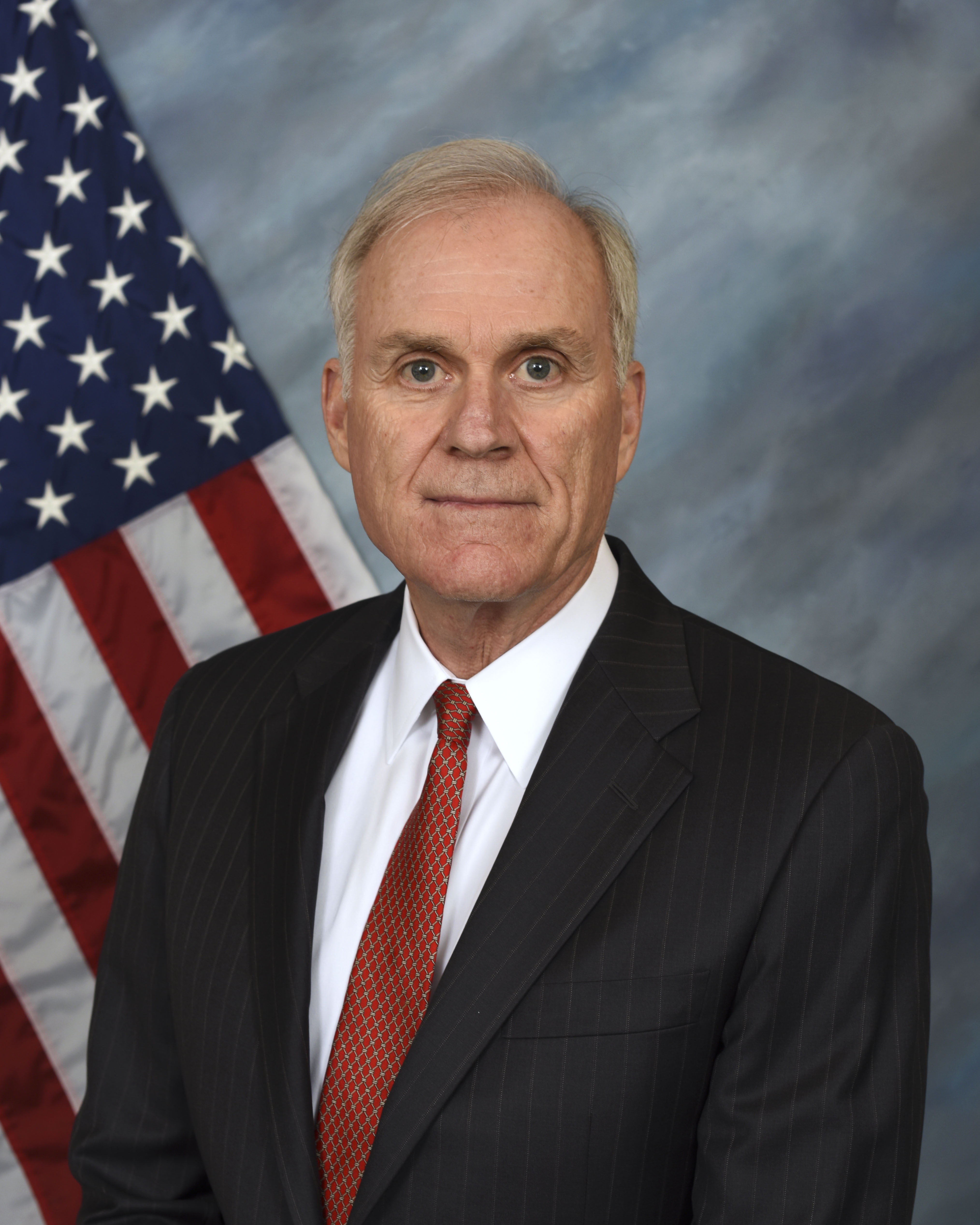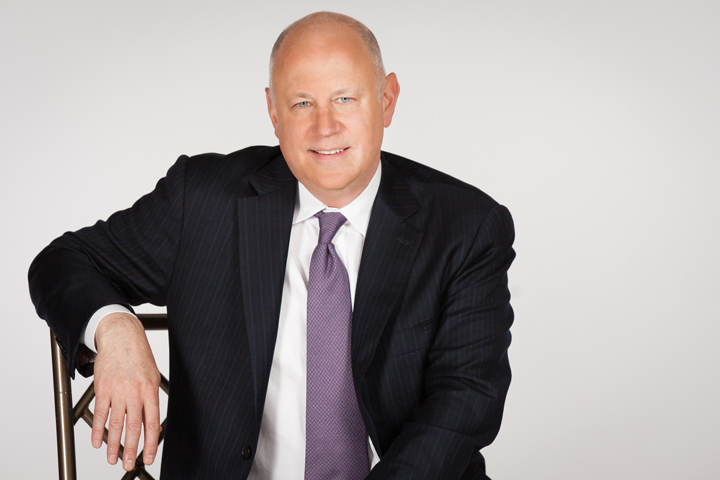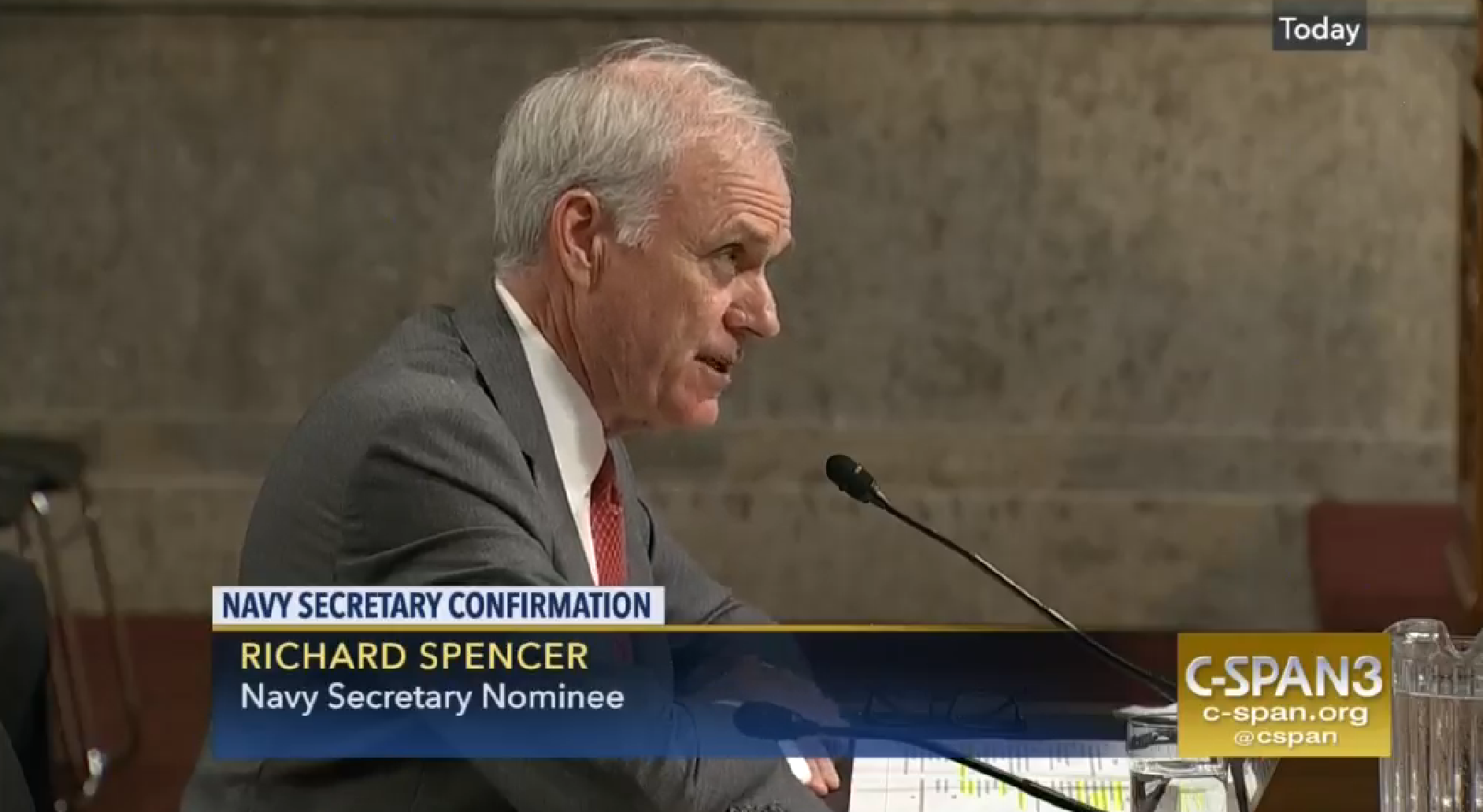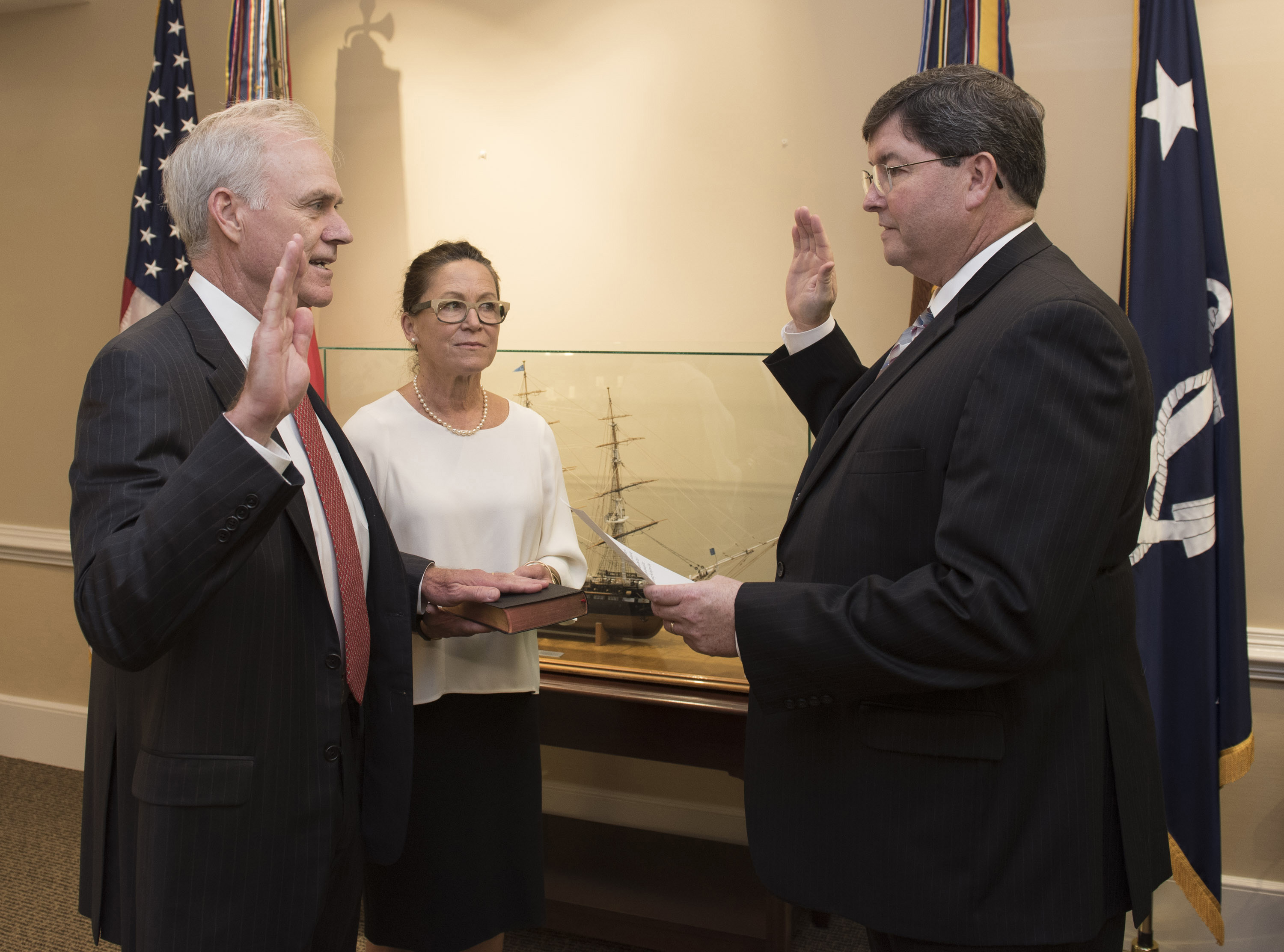
Richard V. Spencer isn’t afraid to question popular wisdom in search of a better answer.
For months before the new Secretary of the Navy’s confirmation hearing, Capitol Hill had been abuzz with talk of the Navy growing to 355 ships – a number that, if not set in stone, was at least put in pending legislation.
Yet during his July Senate Armed Services Committee confirmation hearing, in his first opportunity to publicly weigh in on the future of the Navy, Spencer told the panel he questioned that fundamental tenet of the Navy’s plan to expand.
“The 355 is a good number for people to focus on. Do we know exactly what the mix is? I think, since we’re talking out a decade, we might not know, and we shouldn’t know right now, because we have evolving technologies,” Spencer told the Senate in July.
“Whether it’s a 355-ship or not, what we also want to get our head around is, can we have a capacity number, but have a capability that’s even greater than that, so have the capability of a 355 that might be a 300-ship Navy.”
Those who have worked with Spencer, a former Marine Corps CH-46 pilot, told USNI News not to expect him to bend the knee to established Department of the Navy orthodoxies, and that he would bring to the Pentagon a penchant for adopting emerging technologies and challenging standard operating procedures.
Spencer, they say, is motivated more by the challenge of building something that runs well rather than making money or accruing resume-stuffers. While he amassed a tidy fortune along the way, he made a name for himself in both finance and Department of Defense circles by being frugal and embracing disruptive technologies.
Building Up the Intercontinental Exchange

In November 2005, Spencer, then the chief financial officer of Intercontinental Exchange (ICE), helped guide the online commodities trading company through a very successful initial public offering. Shares closed at $39.25 the first day of trading – 51 percent above the initial $26-per-share offering price –in the sort of first day of trading any chief executive hopes for when taking a private firm public.
“The company owes him a great debt of gratitude,” Jeffrey Sprecher, chief executive of Intercontinental Exchange, told USNI News.
In 1999, Sprecher was forming Intercontinental Exchange, a firm devoted to online commodities trading, with a handful of employees and using his personal checking account for expenses. The idea, according the company, was to use an electronic trading platform to bring transparency to commodities trading.
Meanwhile, Enron started EnronOnline, an e-commerce business allowing wholesale customers to view the company’s real-time pricing and complete commodity trades with Enron as the principal, according to a description of the site in Enron’s Securities and Exchange Commission filings. The site ultimately included metals, pulp, paper and lumber, coal and steel.
When Enron collapsed two years later in 2001, in the nation’s largest bankruptcy up to that point, EnronOnline, one of the world’s largest and exclusively electronic commodities trading operations, was also dragged down.
“Back in that era, we had a lot of naysayers,” Sprecher said. “People said you can’t sell commodities online. But it turns out this is the perfect thing to do online.”
Spencer agreed to leave his firm in Dallas and join Sprecher’s Atlanta-based e-commerce start-up business specializing in commodities trading. As Chief Financial Officer, Spencer’s job was to help sell Intercontinental Exchange’s potential and establish the type of accounting system a large publicly traded company would use; the sort of system large investors wanted to see in the wake of Enron.
“When you have a private company and take it public, a big part of that is taking the message of what the company does and what it can do to the asset fund managers and get them excited,” Sprecher said.
“Richard is really a gifted communicator, a natural networker.”
Spencer’s Wall Street background and the transparent accounting system he established proved invaluable to convincing large institutional investors that online commodities trading was the future, even if at the time one of the largest such companies became a household name because of its failure, Sprecher told USNI News.
Launching a company, Sprecher said, isn’t so much about great ideas as it is about meeting investor expectations.
“You don’t have to have invented it,” he said. “It’s about who can execute.”
Business Approach

Today, Intercontinental Exchange runs a variety of online commodities and futures trading platforms and owns the New York Board of Trade and the New York Stock Exchange, including NYSE’s European exchange Euronext.
Spencer had been gone from Intercontinental Exchange for five years by time it bought the New York Stock Exchange and its NYSE Euronext company in 2012. But Spencer’s work helping Sprecher establishing a viable online commodities trading company set the groundwork for what was an $8.2-billion acquisition. The New York Stock Exchange was the world’s largest exchange, and the entire NYSE Euronext company represented a third of the world’s stock trading when its acquisition by ICE was announced.
“Technology, however, has altered the terrain for traditional stock market operators,” was how a 2012 CNBC story summarized the purchase. “The largest companies have been forced to buy out smaller competitors, as part of efforts to keep pace with rapid electronic trading, and build a footprint in various asset classes that are more profitable than stocks.”
When Spencer left his role as Intercontinental Exchange’s chief financial officer, he become vice chair of the New York Board of Trade, which ICE acquired in January 2007. Spencer was part of the leadership team that moved the old commodities exchange onto an online platform.
The New York Board of Trade is the commodities exchange for such products as coffee, cotton and frozen concentrate orange juice, and is perhaps best known for its role at the end of the 1983 movie “Trading Places” starring Eddie Murphy and Dan Aykroyd.
“That exchange was very old and had not embraced technology and was falling behind,” Sprecher said, adding that Spencer worked to modernize the New York Board of Trade in 2007 at the same time its competitor in Chicago – the combined Chicago Board of Trade and Chicago Mercantile Exchange – was attempting to do the same.
By 2008, Spencer had left International Exchange entirely. Sprecher, who still keeps in touch with him, explained his friend was ready for a new challenge – sailing a new yacht he’d purchased – and the firm was ready for a chief financial officer to run a mature firm.
“He’s very frugal and sensible. You need that when starting a company,” Sprecher said. “We replaced Richard with a guy from IBM, who was a more traditional CFO.”
Challenging DoD Status Quo

When Spencer announced he was leaving his chief financial officer post, he had just reaped his reward for helping build-up the company. In March 2007, Spencer cashed in his stock options – part of a long-term incentive plan designed to reward top executives for good work – earning more than $22 million over the course of a few days.
With that payout, Spencer did not need to find a new job right away. But he began working with the Marine Corps Heritage Foundation around that time, Walter Boomer, a retired Marine Corps general and former chairman of the Marine Corps Heritage Foundation, told USNI News – not to pad his resume, but rather just to help.
Boomer praised Spencer’s contributions as bringing a fresh look, but not a radical look, to the organizations he’s served, and for seeking ways to improve operations.
“He’s not going to come in and be a slash-and-burn secretary,” Boomer said. “He’s too wise for that.”
Boomer pointed to when Spencer joined the Marine Corps Heritage Foundation, at a time the organization was raising funds to open the National Museum of the Marine Corps. With Spencer’s help, Boomer said, most of the money raised came from private donors.
Boomer also points to Spencer’s work with the Defense Business Board, where he served from 2009 to 2015, as an act of selflessness that speaks to his desire to improve the military.
“There’s no real accolade that comes from serving on that,” Boomer said.
During his Senate confirmation hearing, Spencer shared an anecdote from when the board released a study on the modernization of the military retirement system, illustrating both his recognition how disruptive innovation can be and his sense of humor.
“When we rolled that program out, our study out, there was quite a bit of feedback,” Spencer said in his testimony.
“In fact, one of the veterans service organizations was nice enough to publish my home email and my home phone. And I took 127 phone calls.”
“And it was fascinating, once you got through anger and frustration and you started talking to people – and you came with the following approach: You have a dollar to spend on your benefits,” Spencer said in his testimony.
“Your retirement costs 60 cents, your health care costs 40 cents, your commissary costs 15 cents, your morale and welfare costs 7 cents. Where do you want to spend your dollars?”
Joe Wright, a senior advisor to merchant banking firm The Chart Group, was with Spencer at the Defense Business Board when Spencer was fielding calls from angry veterans.
“You can tell on the first day how committed someone is to the board,” Wright said.
Wright, who has served on a variety of government advisory boards, and was the director of the Office of Management and Budget in the Reagan Administration, said it’s common on some government advisory boards for members to show up, find it entertaining to meet members of Congress and cabinet secretaries, and not do much else. They simply want to check a box on their political resume, he said.
“The Defense Business Board is one where you really roll up your sleeves and work,” Wright said.
“Richard, when he first came in, he came in with his sleeves already rolled up.”
Along with working on the veteran’s benefits study, Spencer also immediately set out to review the Defense Logistics Agency and conduct a study suggesting shuttering the Defense Commissary network inside the United States and instead offering military personnel and retirees benefits at participating retailers.
These suggestions, especially the commissary one, were instantly besieged by a variety of groups. Wright chuckled a bit remembering the pushback and lobbying effort to protect commissaries.
When brought up during confirmation hearing, Spencer stated the commissary idea “was an interesting proposal. I mean, it was an interesting study, and it never became a formal proposal, but it ended up in The Washington Post.”
Transition to Political Appointee

Being a political appointee isn’t for everyone coming in from the private sector, Wright said. The Navy has a lot of restrictions placed on it by government regulations, federal budget rules, and financial disclosure rules that appointees must follow.
Then there’s congressional oversight, Wright said. Somebody in Spencer’s new post doesn’t just answer to the president and secretary of defense, but also must contend with members of Congress, who might not see things the same way as the executive branch.
During his Senate Armed Services Committee confirmation hearing, Spencer was asked about how he envisioned working with Capitol Hill. Answering to varied bosses didn’t sound very new to him.
“From the time I left the Marine Corps and entered private sector, I have reported to either, quote, unquote, my bosses. And then, as I progressed down my career and ran companies, I still reported to a board of trustees or a board of directors or an executive committee. And that’s the way I’ve been trained,” Spencer said.
“It works the best. It’s been proven to work the best. I look to you all as the board of directors. You are my, quote, unquote, partners in this – senior partners, I agree. And I look for you for guidance and direction.”
Trump’s first SECNAV nominee, financier Philip Bilden, dropped out of consideration for the position due to the massive amounts of investments he would have to divest to take the position.
“After an extensive review process, I have determined that I will not be able to satisfy the Office of Government Ethics requirements without undue disruption and materially adverse divestment of my family’s private financial interests,” Bilden said in statement announcing his decision in February.
Secretary of Defense Jim Mattis later released a statement saying the withdrawal “was a personal decision driven by privacy concerns and significant challenges he faced in separating himself from his business interests. While I am disappointed, I understand and respect his decision, and know that he will continue to support our nation in other ways.”
“A lot of people won’t do it because it’s a major disruption to their career,” Wright said.
“But Richard isn’t like that. He wants to serve.”





